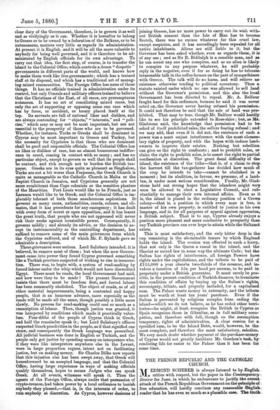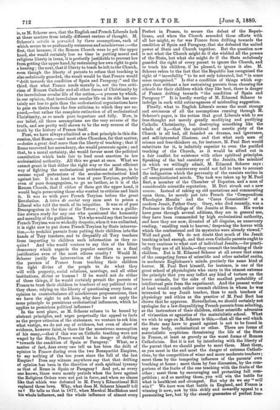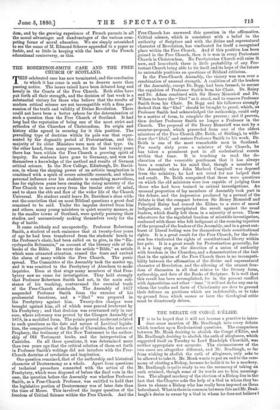THE FRENCH REPUBLIC AND THE CATHOLIC CHURCH.
%J[ EDMOND SCHERER is always listened to by English .111 • critics with respect, but the paper in the Contemporary Review for June, in which he endeavours to justify the recent attack of the French Republican Government on the principle of free education, will hardly convince any reasonable -English reader that he has even so much as a plausible .case. The truth is, as M. Scherer sees, that the English and French Liberals look at these matters from totally different centres of thought. M. Scherer's article is pervaded by three assumptions, each of which seems to us profoundly erroneous and mischievous ;—the first, that because, if the Roman Church were to get the upper hand, she would certainly lose no time in putting moral and religious liberty in irons, it is perfectly justifiable to prevent her from getting the upper hand, by restraining her own right to gain a hearing ; the next, that if liberty to teach be left to the Church, even though the liberty of parents to refuse that teaching is also sedulously guarded, the result would be that France would "drift towards the condition of Spain and Paraguay ;" and the third, that what France needs morally is, not the free criti- cism of Roman Catholic and all other forms of Christianity by the incredulous secular life of the nation,—a process by which, in our opinion, that incredulous secular life on its side has cer- tainly not less to gain than the ecclesiastical organisations have to gain on theirs from the free criticism to which they are ex- posed,—but rather the complete extinction of all ecclesiastical Christianity, as so much pure imposture and folly. Now, in our belief, all three assumptions are the very reverse of the truth, and are pretty well shown to be the very reverse of the truth by the history of France itself. First, we have always admitted as a first principle in this dis- cussion, that Rome,—and most other Churches, for that matter, —desire a great deal more than the liberty of teaching ; that if Rome recovered her ascendancy, she would persecute again ; and that, to a moral certainty, she would favour most the political constitution which bade fair to lend most sanction to her ecclesiastical authority. All this we grant at once. What we cannot grant is that either the right way or the most efficient way of fighting the ecclesiastical pretensions of Rome, is to assume equal pretensions of the secular-ecclesiastical kind against her. It is at least as true of pure Toryism, probably even of pure demagoguism, to go no farther, as it is of the Roman Church, that if either of them got the upper hand, it would begin persecuting those who wanted to criticise and limit it. It was so with pure French Toryism before the great Revolution. A lettre de cachet very soon sent to prison a Liberal who told the truth of its iniquities. It was so of pure Demagoguism in the time of the Terror ; there was a guillo- tine always ready for any one who questioned the humanity and morality of the guillotine. Yet who would say that because French Toryism was so wickedly despotic, when it was unlimited, it is right now to put down French Toryism by State interven- tion,—to prohibit parents from putting their children into the hands of Tory teachers, and to disqualify all Tory teachers from imparting to children such information as they re- quire ? And who would venture to say this of the bitter democracy which regards the popular sanction as a final justification even of the most odious cruelty ? Would M. Scherer justify the intervention of the State to prevent the parents of France from teaching their children the right divine of the people to do what they -will with property, social relations, marriage, and all other institutions, divine or human ? If he would not do either -of these things, if he would certainly permit the parents of France to trust their children to teachers of any political views they chose, relying on the liberty of questioning every form of opinion to counterbalance all mischievous prepossessions, then we have the right to ask him, why does he not apply the same principle to pernicious ecclesiastical influences, which he applies to pernicious political influence? In the next place, as M. Scherer refuses to be bound by abstract principles, and urges perpetually the appeal to facts as the proper criterion of the statesman, we venture to ask him what vestige, we do not say of evidence, but even of show of evidence, however faint, is there for the monstrous assumption of his essay,—that if this war on Catholic teaching were not waged by the State, France would be in danger of drifting "towards the condition of Spain or Paraguay." What, as a matter of fact, does every one tell us has been the drift of opinion in France during even the two Bonapartist Empires, to say nothing of the ten years since the fall of the last Empire? Does any witness anywhere say that that drifting of opinion has been in the direction of such spiritual tyranny as that of Rome in Spain or Paraguay ? And yet, as every one knows, these were mostly periods when the laws against the Religious Orders were not pat in force, and when no clause like that which was defeated in M. Ferry's Educational Bill replaced those laws. Why, what does M. Scherer himself tell us. I Re tells us that in 1877, when Marshal MacMahon used his whale influence, and the whole influence of almost every Prefect in France, to secure the defeat of the Repub- licans, and when the Church seconded those efforts with all her might, so far was France from drifting towards the condition of Spain and Paraguay, that she defeated the united power of State and Church together. But the question now is not what the Church might do if she wielded all the powers of the State, but what she might do if the State sedulously guarded the right of every parent to ignore the Church, and to teach his children, if he pleased, to ignore it also. M. Scherer refers to the fact that the Republic has recognised the right of " incredulity " to be not only tolerated, but "in some sense recognised." Is that a condition of things which sug- gests that without a law restraining parents from choosing the schools for their children which they like best, there is danger of France drifting towards "the condition of Spain and Paraguay ?" It is hardly worthy of M. Edmond Scherer to indulge in such wild extravagances of misleading suggestion.
Finally, what to English Liberals seems the most strange and erroneous of all the assumptions running through M. Scherer's paper, is the notion that good Liberals wish to see free-thought not merely greatly modifying and purifying Catholic Christianity, but destroying something like the whole of it,—that the spiritual and ascetic piety of the Church is all bad, all founded on dreams, and ignorance, and self-interested illusions, and that what such men of science and free-thinkers as, for instance, M. Paul Bert would substitute for it, is infinitely superior to even the purified teaching of the Church, as it would be sifted out in a fair conflict for existence with other spiritual principles. Speaking of the bad casuistry of the. Jesuits, the mischief in which we willingly admit, M. Edmond Scherer says : —" The present controversy could not fail to turn to account the indignation which the perversity of the casuists excites in all unsophisticated minds. The task was taken up by M. Paul Bert, a member of the Chamber of Deputies, and a man of considerable scientific reputation. M. Bert struck out a new course. Instead of raking up old quotations and commenting upon them, he merely put into French the 'Compendium Theologies Moralis ' and the Casus Conscientias ' of a modern Jesuit, Father Gury. Gury, who died recently, was a Professor in the College of the Jesuits at Rome. His works have gone through several editions, they are in general use, they have been commended by high ecclesiastical authority, and here they are now, divested of all disguise, an unsavoury reading, smelling rank to heaven,' deepening the horror with which the confessional and its mysteries were already viewed." Well and good. We do not doubt that much of the Jesuit teaching is bad enough, and that even Catholic parents ought to be very cautious to what sort of individual Jesuits,—for practi- cally they are of all kinds,—they commit the teaching of their children. But is M. Edmond Scherer at all aware that some of the competing forms of scientific and other unbelief excite, in moderate Englishmen's minds, precisely the same kind of horror. M. Paul Bert himself, for instance, is one of the great school of physiologists who carry to the utmost extreme the principle that you may inflict any kind of torture on the lower animals, for the sake of the smallest probability of intellectual gain from the experiment. And the present writer at least would much rather commit children in whom he was interested to any Jesuit teacher, than to such teachers of physiology and ethics as the practice of M. Paul Bert has shown that he approves. Nevertheless, we should certainly not apologise for a law disqualifying French parents from selecting, as the instructors of their children, either scientific advocates of vivisection or agnostics of the materialistic school. What we wish to urge on M. Scherer is this,—that all the evil which the State may have to guard against is not to be found in any one body, ecclesiastical or other. There are forms of materialistic scepticism threatening the life of the State in France, at least as gravely as the worst forms of Roman Catholicism. But it is not by interfering with the liberty of the parent that we should prefer to meet them. Meet them, as you must in the end meet the danger of extreme Catholi- cism, by the competition of wiser and more moderate teachers ; meet them by the tempering influence of the parents' own teaching at home ; meet them by free discussion, by the com- parison of the fruits of the one teaching with the fruits of the other ; meet them by encouraging and protecting full com- petition; and so meeting them, you will win the battle for what is healthiest and strongest. But why do we say "will win V" We have won that battle in England, and France is winning it now, not by this sickly and cowardly appeal to a persecuting law, but by the- steady guarantee of perfect free.
dom, and by the growing experience of French parents in all the moral advantages and disadvantages of the various com- peting forms of moral education. We are simply astonished to see the name of M. Edmond Scherer appended to a paper so feeble, and so little in keeping with the facts of the French educational controversy, as this.




































 Previous page
Previous page